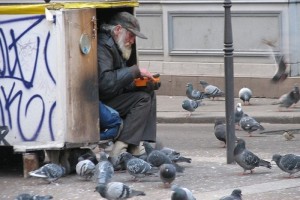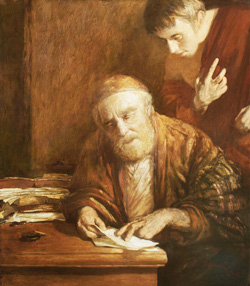And he began to tell the people this parable: “A man planted a vineyard and let it out to tenants and went into another country for a long while . . . Luke 10:9

He’s raised his voice just loud enough for them to hear—the delegation of elders, chief priests, scribes. Almost as if they can’t help themselves, they turn to listen.
The story is simple: a man plants a vineyard. He rents it out and leaves the province to attend to matters elsewhere. It’s an arrangement not unknown among priests and the Levites who own land outside of Jerusalem entrust their fields to local farmers while they tend to their duties in the city.
“When the time came, he sent a servant to the vineyard to collect his share of the produce. But the tenants beat the servant and sent him away empty-handed. He sent another servant, and another after that. But in every case, the tenants treated the owner’s servants shamefully, and sent them away with nothing.”
What a way for tenants to behave! How would they expect to get away with that? Some of the teacher’s stories make sense, but this one is completely outside human reasoning.
“Then the owner of the vineyard said, ‘What shall I do? I will send my only son; perhaps they will respect him.’ But when the tenants saw him, they said to themselves, ‘This is the heir: Let us kill him, to the inheritance may be ours.’ And they threw him out of the vineyard and killed him. What should the owner of the vineyard do then?”
Listening hard, the elders, priests, scribes and Pharisees begin to suspect a trap. There he goes again, speaking of a father and a son (my Father; my house); is he implying that they are the spiteful tenants?
And speaking of vineyards, it’s almost impossible for the learned among them to block out a passage of scripture. It steals upon them unbidden, a song of supreme disappointment:
I will sing about the one I love, a song of my beloved’s vineyard;
My beloved had a vineyard on a very fertile hill.
He broke up the soil, cleared it of stones, and planted it with the finest vines . . . (Isaiah 5:1-3)
Yahweh expected good grapes from them and got worthless grapes. But that was in the old days, when Israel practiced the most blatant idolatry and refused to learn the lessons their God continually tried to teach them. It led to exile—they lost everything and had to sojourn in a foreign land before Yahweh allowed them to come home again. Lesson learned: now they were a people obedient to the law—rigorously, relentlessly. No idols in the temple, no wild orgies to Astarte, no high places sanctified to Baal. They are better than their ancestors. Do you hear that, Jesus of Nazareth? Better.
No better, he seems to be saying. For, what should the owner do? “He will come and destroy those tenants and give the vineyard to others.”
“Surely not!” a voice among the scribes cries out. At least some of them have no doubts at all: this parable is against them.
And so is the teacher. He is looking directly at them, now; no pretense of speaking only to his closest followers. “You don’t think so? Do you recall the psalm which testifies,
The stone the builders rejected
Has become the cornerstone?*
Of course they do. And they know how it continues: This is the Lord’s doing, and it is marvelous in our eyes.
The teacher continues, “Everyone who falls on that stone will be broken to pieces, and when it falls on anyone, it will crush him.”
This is intolerable. No longer is it “my” (as in my house, my Father)—now it’s me. For what else does he mean by this “cornerstone,” except himself? Like a stone he stands among them now, like the massive building blocks that still lie around the temple complex, rejected by the builders for some imperfection, but too much trouble to move. Careless pedestrians have tripped and broken bones over them, and unfortunate souls have been crushed to pulp when they came between a slipping stone and a faulty pulley.
That’s the obvious object lesson. But who would do such a foolish thing as to reject the Lord’s clearly anointed Messiah?
The chief priests, scribes, and Pharisees, now looking on with stony faces.
The fans, the crowds, who have set their hearts on their own expectations,
Even the disciples, the inner circle, who don’t suspect how shallow their loyalty really is.
“You’ve walked over it, around it, past it, but now it lies in the middle of your path. It won’t move; if you fall on it you’ll be broken, but if it falls on you you’ll be crushed.”
The only thing to do, it seems, is climb up on it and take a stand.
__________________________________________________
For the original post in this series, go here.
Next>



 nother and another, belatedly realizing he’s left his stick behind. And his alms-box. Step after step, hands outstretched and fingers spread, he feels the crow both pulling back from and directing him, with a nudge here, a touch of the shoulder there. Until he finally comes to the glowing, living center.
nother and another, belatedly realizing he’s left his stick behind. And his alms-box. Step after step, hands outstretched and fingers spread, he feels the crow both pulling back from and directing him, with a nudge here, a touch of the shoulder there. Until he finally comes to the glowing, living center.

 Moses’ time expect the waters to drown them? Did the people of Sodom and Gomorrah look for fire from the sky? They were going about their lives, eating and drinking and making plans, when doom overtook them. The day is unexpected, and unavoidable. Judgment is certain and surgical—as sweeping as a scythe, and yet as precise as a needle. It will puck out or cut down, whether in a crowd of thousands or the dark and quiet of a bedroom.”
Moses’ time expect the waters to drown them? Did the people of Sodom and Gomorrah look for fire from the sky? They were going about their lives, eating and drinking and making plans, when doom overtook them. The day is unexpected, and unavoidable. Judgment is certain and surgical—as sweeping as a scythe, and yet as precise as a needle. It will puck out or cut down, whether in a crowd of thousands or the dark and quiet of a bedroom.”

